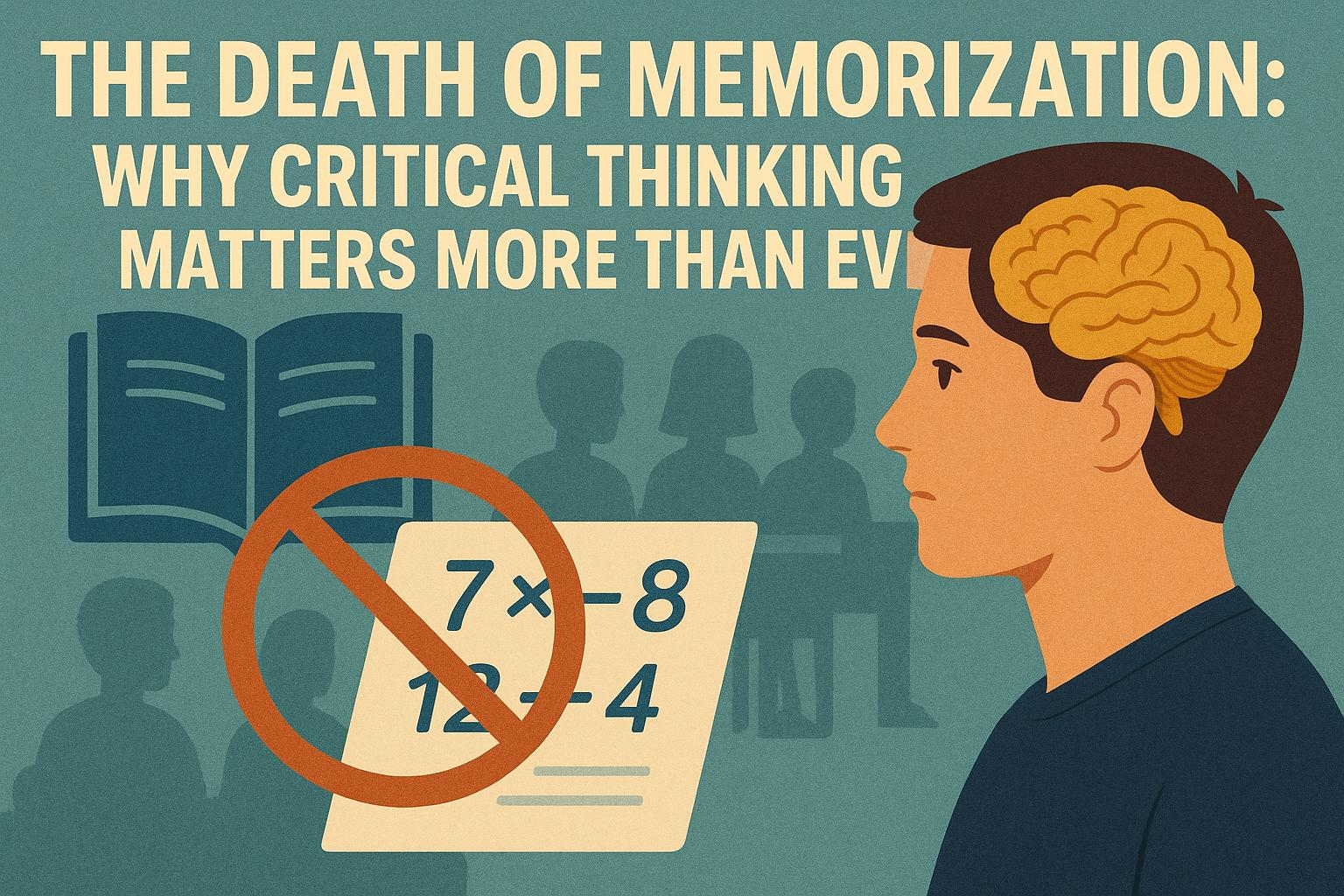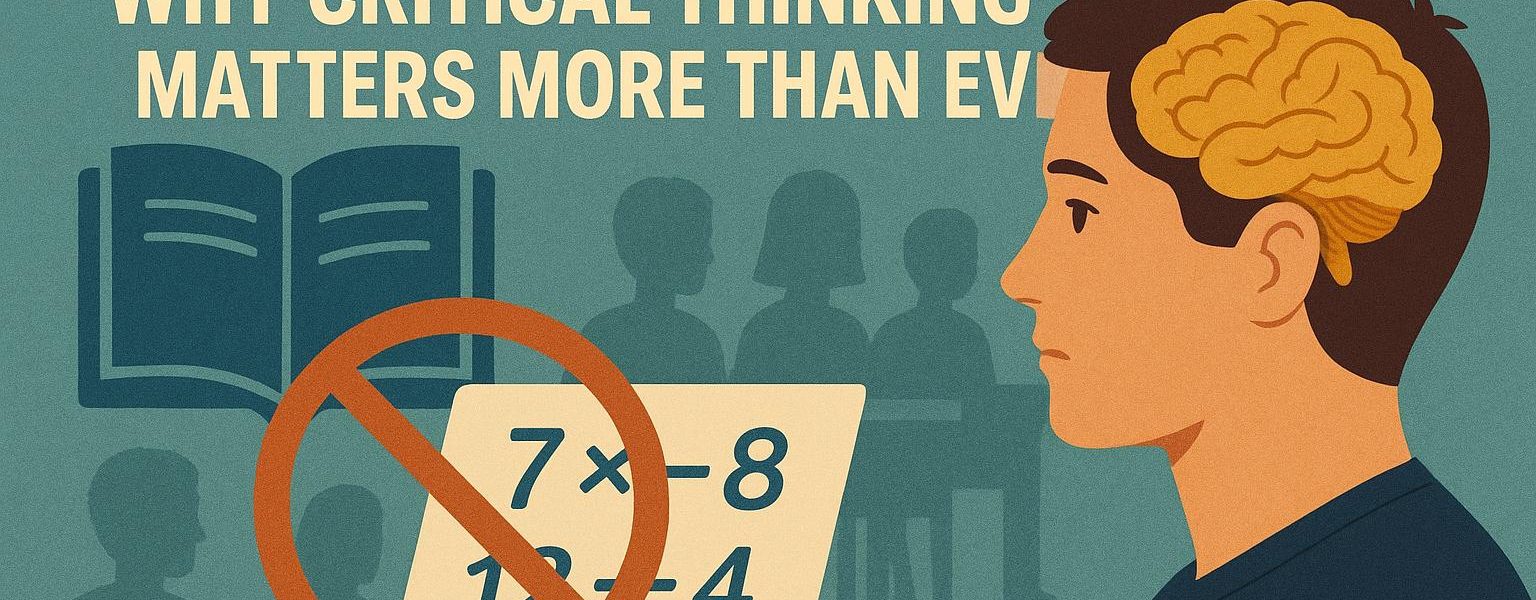For centuries, education systems across the world measured success by how well students could memorize and reproduce information. Exams rewarded recall, teachers valued repetition, and students competed on who could remember more facts. But in 2025, this model is quickly losing relevance. With Artificial Intelligence and instant access to knowledge, memorization is no longer the core of learning. The real skill for the future is critical thinking — the ability to question, analyze, and apply information meaningfully.

The Era of Memorization
Memorization once made sense. In times when books were rare and information was scarce, remembering details was essential for survival and progress. Doctors memorized symptoms, lawyers memorized laws, and students memorized history to preserve collective wisdom. But what was once necessary has become outdated in a world where knowledge is literally a search away.
Why Memorization No Longer Defines Education
Today, a student with a smartphone has more access to facts than entire libraries of the past. Algorithms can retrieve answers in seconds, leaving memorization less impressive and less useful. The workforce of tomorrow doesn’t need walking encyclopedias — it needs thinkers who can filter, challenge, and apply information creatively.
The Rise of Critical Thinking
Analysis over recall: Employers now prize people who can evaluate evidence and make sound decisions, not just repeat facts.
Problem-solving: Complex global issues — climate change, inequality, ethics in AI — require innovation, not rote answers.
Creativity and adaptability: The ability to connect ideas across fields is becoming more valuable than mastery of static content.
Ethical reasoning: In an AI-driven era, humans must decide how to use knowledge responsibly, something memorization alone cannot teach.
Stories of the Shift in Action
In Finland, one of the most progressive education systems in the world, schools have moved away from subject-based memorization to phenomenon-based learning, where students explore real-world problems. In the U.S., universities are redesigning courses to emphasize critical analysis and teamwork over standardized testing. In Kenya, young entrepreneurs trained in design thinking are solving local community challenges, showing that applied knowledge beats stored facts every time.
The Role of AI in This Shift
Ironically, AI itself is accelerating the death of memorization. With chatbots, digital tutors, and instant translation, students don’t need to carry entire textbooks in their minds. Instead, they must learn how to ask better questions, validate sources, and use information to create solutions. AI is becoming less of a threat to learning and more of a partner in developing higher-order thinking skills.
Challenges to Overcome
Moving beyond memorization requires a shift in mindset. Many education systems still rely on rote learning because it’s easier to test. Parents often equate high grades with intelligence, even if those grades reflect little more than short-term recall. Breaking free from this cycle will take courage, policy reform, and trust that deeper skills matter more than temporary scores.
How Teachers and Learners Can Adapt
Ask “why” and “how” questions: Replace “what is the answer” with “why does this matter” and “how can it be applied.”
Encourage debates and projects: Shift from passive memorization to active exploration of problems.
Use AI wisely: Let AI handle factual recall, while students focus on evaluating and applying information.
Assess differently: Exams should measure reasoning, communication, and creativity, not just memory.
The Bigger Vision
If education succeeds in moving away from memorization, future generations will not only be smarter but also wiser. They will grow up less focused on storing facts and more focused on solving challenges. They will see education not as a competition of memory but as a training ground for creativity, resilience, and ethical action.
Memorization may never disappear entirely — some professions still require recall — but its dominance is ending. The true test of intelligence in the modern world is not “how much do you know” but “what can you do with what you know.”
Frequently Asked Questions
Q1: Does this mean memorization has no value at all?
Not at all. Memorization builds mental discipline and is still useful for foundational knowledge. The key is not to stop memorizing but to stop relying on it as the main measure of learning.
Q2: How can schools encourage critical thinking in students?
By designing lessons around real-world problems, encouraging discussions, and using assessments that test reasoning and creativity instead of rote recall.
#CriticalThinking #FutureOfEducation #InspirationUnlimited





